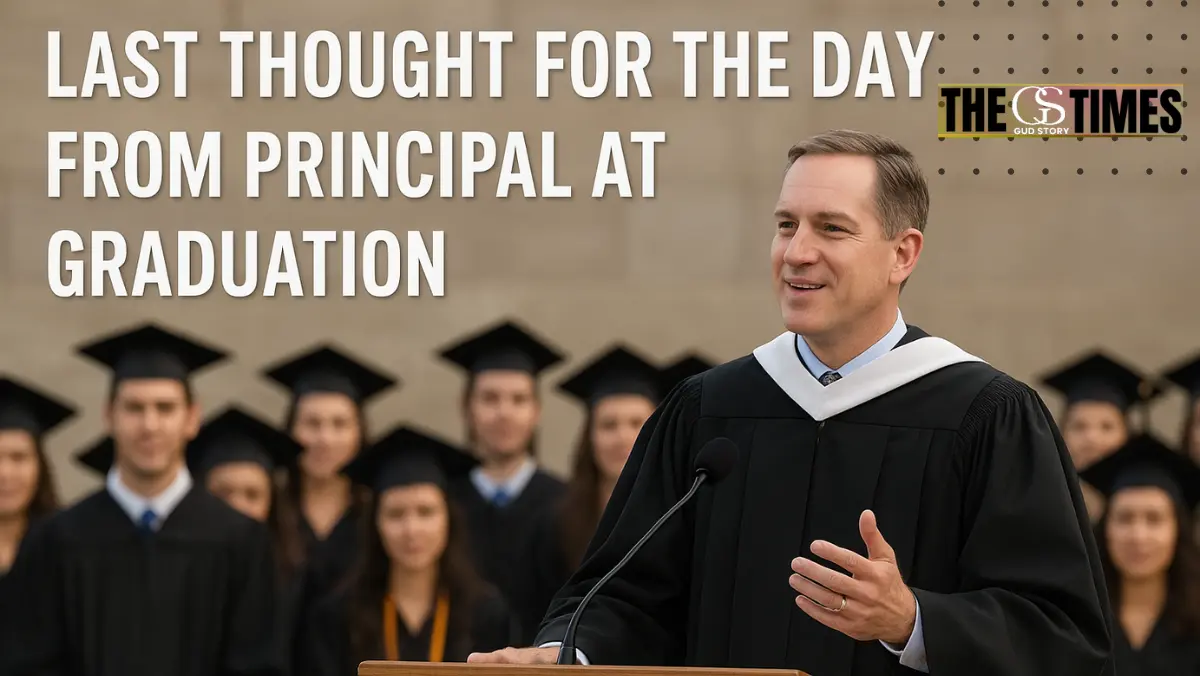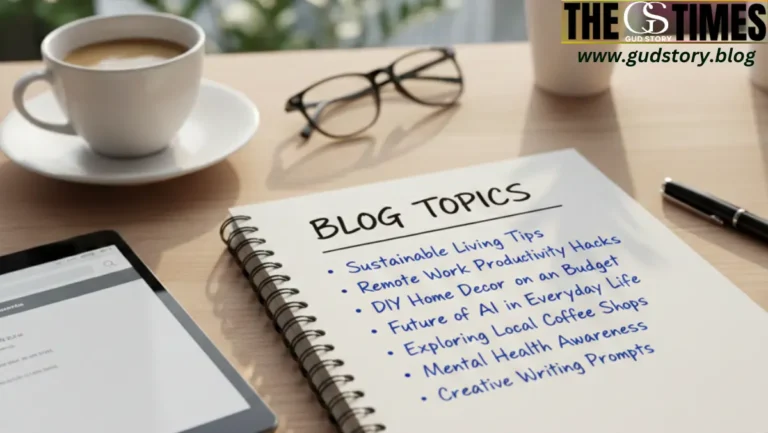
last thought for the day from principal at graduation
Standing behind that podium twenty-three years ago as a first-time principal, I remember my palms sweating more than any graduate’s in the audience. The ceremony was wrapping up, families were shifting in their seats, and I knew the moment had arrived. The last thought for the day from principal at graduation – those final words that would send these young minds into the world. What I said next would either fade into forgotten ceremony noise or stick with them for years to come.
That moment taught me something profound about the weight of words. Your closing remarks at graduation aren’t just ceremonial fluff. They’re the final gift you give to students who’ve trusted you with their educational journey.
Why Your Final Words Matter More Than You Think
Here’s what I learned during my three decades in education: people remember beginnings and endings. Everything in the middle? That’s where things get fuzzy. Psychologists call this the “serial position effect,” but I call it the reality of human attention spans.
I’ve watched thousands of graduates over the years. Some remember their valedictorian’s speech. A few recall the guest speaker. But almost everyone remembers what their principal said last. Those final words at the graduation ceremony become the soundtrack that plays in their heads as they walk across the stage.
The principal graduation speech serves as more than just administrative duty. You’re the educational shepherd who’s watched these kids grow from awkward freshmen into confident young adults. Your farewell message carries weight because you’ve been there through their struggles, celebrations, and everything between.
The Art of Crafting Meaningful Graduation Messages
When searching for that perfect short last thought for the day from principal at graduation, remember that authenticity trumps eloquence every time. I learned this lesson the hard way during my fifth year as principal.
I’d crafted what I thought was a brilliant, philosophical closing. Lots of fancy words about “embarking upon life’s great odyssey.” The kids looked at me like I was speaking ancient Greek. That’s when Mrs. Henderson, our veteran English teacher, pulled me aside afterward.
“Principal Martinez,” she said with that gentle but firm tone teachers perfect over decades, “they need to hear from you, not from a graduation speech template you found online.”
She was absolutely right. The most powerful graduation day wisdom comes from your heart, not from someone else’s playbook.
Categories of Powerful Closing Thoughts
Dream Big Endings
These closing remarks ceremonies focus on future possibilities and unlimited potential. Here’s one I used that really resonated:
“Class of 2019, as I look at your faces tonight, I don’t see endings. I see beginnings. I see doctors who haven’t diagnosed their first patient yet, teachers who haven’t inspired their first student, entrepreneurs who haven’t launched their first company. Your dreams aren’t too big – the world is just waiting for you to make them reality.”
This approach works particularly well when your graduating class has faced significant challenges. I used variations of this last thought for the day from principal at graduation speech during difficult years when students dealt with economic hardship or community struggles.
Character First Messages
Sometimes the most important thing principals say at graduation focuses on who students become, not what they achieve. Character-based endings resonate deeply because they address the person behind the diploma.
“Tonight you receive a diploma that certifies your academic achievement. But the real measure of your success won’t be written on any certificate. It’ll be written about how you treat people who can do nothing for you, how you stand up when standing up costs you something, and how you lift others when you yourself are struggling.”
These inspirational graduation quotes work especially well for smaller schools where you know students personally and have witnessed their character development firsthand.
Gratitude and Legacy Closings
Nothing connects like shared experience and acknowledged growth. I often incorporate educational milestone reflection that honors both struggle and triumph:
“You’ve given us the privilege of being part of your story during some of the most transformative years of your life. We’ve celebrated your victories and supported you through challenges. Now it’s time for you to take everything you’ve learned within these walls and add your own chapters to the world’s story.”
This style of academic achievement celebration works beautifully when you want to acknowledge the school community’s role in student success while empowering graduates to move forward confidently.
Call to Action Statements
Some occasions demand more than inspiration – they require activation. These endings challenge graduates to be difference-makers:
“Class of 2020, you’re graduating during one of the most challenging times in recent history. That’s not a burden – that’s your calling. The world needs problem-solvers, and we’ve spent four years teaching you how to solve problems. Go solve them.”
This approach for your commencement address finale works particularly well when addressing social issues, community needs, or global challenges your students are passionate about.
Circle Back Endings
The most satisfying conclusions often return to themes introduced earlier in the ceremony or throughout the school year. This creates a sense of completion and unity:
“At the beginning of this year, I challenged you to ‘leave it better than you found it.’ Tonight, as I look at the improvements you’ve made to our school culture, the younger students you’ve mentored, and the positive changes you’ve brought to our community, I can honestly say – mission accomplished. Now take that same spirit and improve the world.”
Personal Journey: Learning from My Mistakes
My worst graduation ending happened in 2007. I’d prepared what I thought were profound meaningful graduation messages, full of metaphors about ships leaving harbor and eagles leaving nests. Halfway through my closing remarks, I realized I was losing them. Their eyes were glazing over, parents were checking phones, and even I was getting bored with my own words.
That’s when I threw out my prepared script and spoke from the heart about Sarah Mitchell, a student who’d struggled with severe anxiety but pushed through to graduate. I talked about Marcus Thompson, who’d lost his father junior year but channeled his grief into community service. I mentioned Priya Patel, who’d moved here from India freshman year and become our student body president.
The room came alive. Suddenly people were crying, laughing, nodding. That night taught me that the best graduation day thoughts aren’t abstract concepts – they’re specific stories that reflect universal truths.
Practical Implementation Strategies
Timing and Delivery
Your last thought for the day from principal at graduation should be concise but substantial. Aim for 90 seconds to two minutes maximum. Any longer and you risk losing your audience when they’re already emotionally and physically drained from the ceremony.
Practice your delivery multiple times, but don’t memorize word-for-word. You want to sound conversational, not robotic. I always kept my key points on index cards rather than reading from a full script.
Matching Tone to Context
A short graduation speech by principal PDF might work for some ceremonies, but the most effective approaches adapt to specific circumstances. Urban schools dealing with challenges need different messaging than suburban schools celebrating abundance. Alternative schools serving at-risk students require different principal’s parting advice from graduates than traditional high schools.
Cultural Considerations
For schools with diverse populations, incorporating multiple cultural perspectives enriches your message. I’ve successfully used last thought for the day from principal at graduation tagalog elements when addressing Filipino families in our community. The key is authenticity – only incorporate what genuinely reflects your school’s culture.
Templates and Customization Options
Short Format Template
“Class of [Year], as you leave [School Name] tonight, remember this: you are prepared. Not just academically, but personally. You’ve learned to think critically, communicate effectively, and treat others with respect. The world needs exactly what you have to offer. Go offer it boldly.”
Extended Format Template
“[Personal observation about the graduating class], I want to leave you with three thoughts as you begin this new chapter. First, [specific advice based on school motto or values]. Second, [challenges related to current events or community needs]. Finally, [affirmation of their readiness and your confidence in them]. Class of [Year], you will always be part of the [School Name] family. Make us proud – but more importantly, make yourselves proud.”
Real-World Examples That Worked
During the pandemic graduation of 2020, traditional ceremonies were impossible. Our virtual celebration required different ways to end graduation speech approaches. Here’s what resonated:
“Class of 2020, your senior year didn’t end the way any of us expected. You missed prom, senior skip day, the traditional graduation walk. But you gained something invaluable – you learned that you can adapt, persist, and succeed even when everything changes around you. That’s a life skill no classroom could have taught you. You’re not the class that lost their senior year – you’re the class that proved nothing can stop you.”
That closing generated more positive feedback than any traditional ceremony ending I’d ever delivered.
Common Mistakes to Avoid
After reviewing countless graduation speech by principal PDF examples and witnessing numerous ceremonies, here are the pitfalls that undermine otherwise strong closings:
Generic Platitudes: Avoid overused phrases like “follow your dreams” or “the future is bright” without adding personal context or specific meaning.
Excessive Length: Your senior class sendoff shouldn’t require its own intermission. Respect your audience’s time and attention span.
Inappropriate Tone: Match your message to your audience. Overly formal language can feel disconnected, while too casual an approach might undermine the ceremony’s significance.
Missing Personal Connection: The most forgettable speeches are the ones that could have been delivered at any school to any graduating class.
Building Your Own Signature Style
The best principal graduation speech PDF examples I’ve studied all share one quality: they reflect the unique voice and perspective of their author. Your school administrator’s blessing should sound like you, not like someone you’re trying to imitate.
Start by identifying what makes your relationship with students special. Are you the principal who knows every student’s name? The one who shows up to every sporting event? The administrator who instituted innovative programs? Whatever defines your leadership style should influence your graduation message style.
Advanced Techniques for Maximum Impact
The Callback Method
Reference something from earlier in the ceremony or the school year. This creates cohesion and demonstrates that your words aren’t generic but specifically crafted for this moment and this class.
The Time Capsule Approach
Plant a phrase or concept that students will understand more deeply as they mature. I once told a graduating class, “Success isn’t what you accomplish – it’s what you overcome.” Many students contacted me years later saying they finally understood what I meant.
The Community Connection
Tie your message to local history, current events, or community values. This grounds your emotional graduation farewell words in shared experience and collective identity.
Technology and Modern Adaptations
Today’s principals have resources previous generations lacked. Last thought for the day from principal at graduation 2022 and beyond can incorporate multimedia elements, social media integration, and digital distribution methods.
Consider creating a companion best principal graduation speech PDF that families can download and keep. Include quotes, photos, and additional resources that extend the impact of your spoken words.
Measuring Success and Getting Feedback
The best graduation speeches generate response. Alumni reach out months or years later referencing something you said. Parents mention your words in thank-you notes. Current students quote you in their college essays.
But immediate feedback matters too. Watch your audience during delivery. Are they engaged? Emotional? Taking photos or videos? The most successful inspiring messages for graduating class create moments people want to capture and remember.
Adapting for Different School Contexts
Small Rural Schools
Intimate settings allow for more personal graduation ceremony conclusion ideas. You likely know every graduate personally, which enables specific references and shared memories.
Large Urban Schools
Broader themes work better when addressing hundreds of graduates you may not know individually. Focus on shared experiences like school traditions, common challenges, or collective achievements.
Alternative Schools
Students who’ve overcome significant obstacles need memorable graduation ceremony quotes that acknowledge their journey and resilience while projecting confidence in their future success.
Looking Forward: Evolution of Graduation Speeches
The role of principal has evolved, and so should our approach to graduation addresses. Modern students face different challenges than previous generations – social media pressure, economic uncertainty, environmental concerns, global connectivity.
Your last thought for the day from principal at graduation should acknowledge these realities while maintaining optimism and confidence in your students’ abilities to navigate them successfully.
Conclusion: Your Words, Their Future
Every June, I’m reminded why those final words matter so much. The nervous energy in the auditorium, the proud faces in the audience, the mixture of excitement and uncertainty on graduates’ faces – these moments shape memories that last lifetimes.
Your last thought for the day from principal at graduation isn’t just the end of a ceremony. It’s the beginning of your students’ next chapter, and you have the privilege of helping them turn that page with confidence, purpose, and hope.
The best graduation speeches don’t just mark endings – they celebrate beginnings. They don’t just acknowledge achievements – they inspire future greatness. Most importantly, they don’t just say goodbye – they say “until we meet again, go make us proud.”
After three decades of graduation ceremonies, I’ve learned that the words that matter most aren’t the ones that sound the smartest or the most polished. They’re the ones that come from your heart and speak to theirs. Trust yourself, trust your message, and trust your students to carry those words forward into whatever comes next.
FAQs
Q: How long should the last thought from a principal at graduation be?
A: Aim for 90 seconds to 2 minutes maximum. Your audience is already emotionally and physically drained, so keep it concise but impactful.
Q: Should I memorize my graduation closing remarks completely?
A: No, avoid complete memorization. Instead, know your key points well and use note cards for reference. This keeps your delivery natural and conversational.
Q: Can I use humor in my final graduation remarks?
A: Yes, but use it carefully. Light, inclusive humor that celebrates students or shared experiences works well. Avoid anything that could be misinterpreted or exclude anyone.
Q: How do I personalize my message for different graduating classes?
A: Reference specific achievements, challenges the class overcame, unique traditions, or notable events from their time at school. This makes your words memorable and specific to their experience.
Q: What if I get emotional during my graduation speech?
A: Emotion is natural and often appreciated. Take a pause, breathe, and continue. Authentic emotion often creates the most memorable moments for your audience.




